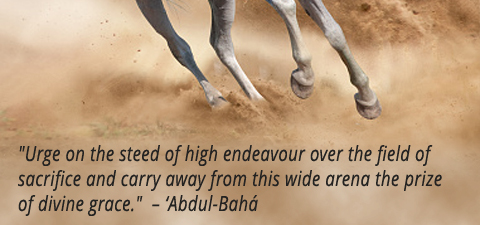|
|
|
Episode 2 June 23, 2021 The Steed of High Endeavour  In January 1853, still suffering from the damaging effects of His imprisonment, Bahá’u’lláh, His family – minus five-year-old Mírzá Mihdí, who was ill at the time – and about 70 Bábís who joined in His banishment, crossed the Zagros Mountains into Iraq during a bitterly cold winter. Ill-equipped either in dress or adequate means of transportation, they suffered untold privations before they reached Baghdad, then a part of the Ottoman Empire, three months later. Nine-year-old Abbás Effendi suffered frostbite and many decades later, His sister Bahíyyih Khanum could barely speak about their horrendous ordeal. Although Bahá’u’lláh had many enemies among government officials and the clerical class, His greatest suffering was to come at the hands of His own younger half-brother, Mírzá Yahyá, who joined the group in Kírmanshah near the Kurdish border. Ever protected by Bahá’u’lláh, he was cowardly, duplicitous and given to travel and to live in various disguises out of a great fear of being recognized as a Bábí. He shadowed the band of followers, arriving in Baghdad some two months later than Bahá’u’lláh. Mírzá Yahyá, who, with the Báb’s approval, had been named as the figurehead of the Bábís in order to draw attention away from Bahá’u’lláh, wasted no time in creating dissension and strife among the rudderless and disillusioned Bábís. With the aid of Siyyid Muhammad Isfahání, named the Anti-Christ of the Bahá’í dispensation, who constantly stoked the fire of Mírzá Yahyá’s jealousy for his brother whose leadership and spiritual superiority were so evident, they spread lies and slander about Bahá’u’lláh, prompting Him to banish Himself to the mountains of Sulaymaniyah as of April 1854 for two years, stating: "The one object of Our retirement was to avoid becoming a subject of discord among the faithful, a source of disturbance unto Our companions, the means of injury to any soul, or the cause of sorrow to any heart." Now living as an undesired guest in Bahá’u’lláh’s house, Mírzá Yahyá held his nephew’s heartbroken family hostage to his fear and paranoia while he plotted his machinations and shameful actions. During that time, Abbás Effendi was educated by His mother and faithful uncle Mírzá Músá, who encouraged Him to memorize and meditate on the Writings of the Báb. By the age of 12, Abbás Effendi could discuss theological matters among the Baghdadi divines, impressing all with His great intellectual and spiritual gifts. When Bahá’u’lláh finally
returned, to the great happiness and relief of His family and followers
– restoring order and gradually rehabilitating the good reputation of
the Bábí community – Mírzá Yahyá melted away among the shadows while
Bahá’u’lláh’s star shone ever so brightly in Baghdad and beyond. Abbás
Effendi, intuiting His father’s great station, perfectly reflected the
noble qualities of His father. While still a teenager, He wrote
extraordinarily profound and superbly written theological essays that
were great achievements for one so young. It was at this time that
Bahá’u’lláh named His son Sirru’llah, the Mystery
of God. |
|
|